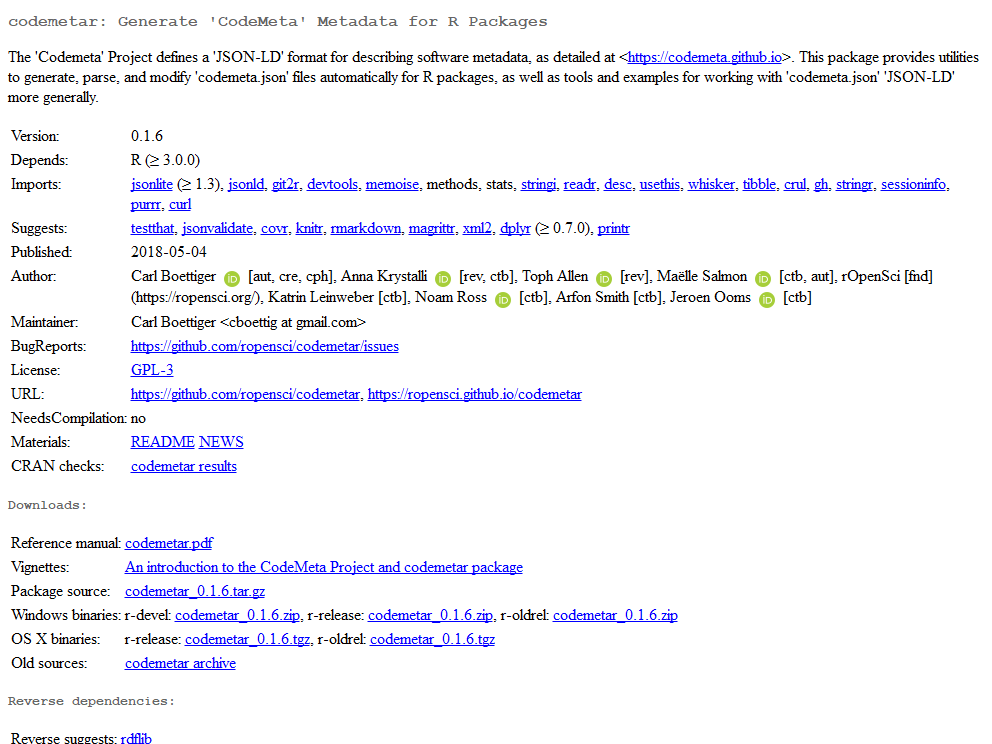Version 7.0.0 of drake just arrived on CRAN, and it is faster and easier to use than previous releases. install.packages("drake") Recap Data analysis can be slow. A round of scientific computation can take several minutes, hours, or even days to complete. After it finishes, if you update your code or data, your hard-earned results may no longer be valid. How much of that valuable output can you keep, and how much do you need to update?
Postagens de Rogue Scholar
Citations are a crucial piece of scholarly work. They hold metadata on each scholarly work, including what people were involved, what year the work was published, where it was published, and more. The links between citations facilitate insight into many questions about scholarly work. Citations come in many different formats including BibTex, RIS, JATS, and many more.

The ssh package provides a native ssh client for R. You can connect to a remote server over SSH to transfer files via SCP, setup a secure tunnel, or run a command or script on the host while streaming stdout and stderr directly to the client. The intro vignette provides a brief introduction.
This week version 2.0 of the V8 package has been released to CRAN. Go get it now! install.packages("V8") The V8 package provides an embedded JavaScript engine that can be used inside of R. You can use it interactively as a JavaScript console, but it is mostly useful for wrapping JavaScript libraries in R packages. Some cool examples include jsonld, jsonvalidate, and daff.
A bit more than one year ago, rOpenSci launched its new website design, by the designer Maru Lango. Not only did the website appearance change (for the better!), but the underlying framework too. ropensci.org is powered by Hugo, like blogdown!
We’ve just released a new version of rnoaa with A LOT of changes. Check outthe release notesfor a complete list of changes.

Last week Google and friends released the new major version of their OCR system: Tesseract 4. This release builds upon 2+ years of hard work and has completely overhauled the internal OCR engine. From the tesseract wiki: We have now also updated the R package tesseract to ship with the new Tesseract 4 on MacOS and Windows. It uses the new engine by default, and the results are extremely impressive!

Proper identification of individuals is crucial for acknowledging andstudying their scientific work, be it journal articles or pieces ofsoftware. In this tech note, one year after CRAN started supportingORCIDs, we shall explain why and how to use unique author identifiers inDESCRIPTION files. Why use ORCIDs on CRAN? When analyzing the authorship of CRAN packages, one can look at authors’names and email addresses.
You might have read my blog post analyzing the social weather ofrOpenScionboarding,based on a text analysis of GitHub issues. I extracted text out ofMarkdown-formatted threads with regular expressions. I basicallyhammered away at the issues using tools I was familiar with until itworked! Now I know there’s a much better and cleaner way, that I’llpresent in this note. Read on if you want to extract insights abouttext, code, links, etc.

rgbif was seven years old yesterday! What is rgbif? rgbif gives you access to data from the Global Biodiversity Information Facility (GBIF) via their API. A samping of use cases covered in rgbif: Search for datasets Get metrics on usage of datasets Get metadata about organizations providing data to GBIF Search taxonomic names Get quick taxonomic name suggestions Search occurrences by taxonomic name/country/collector/etc.